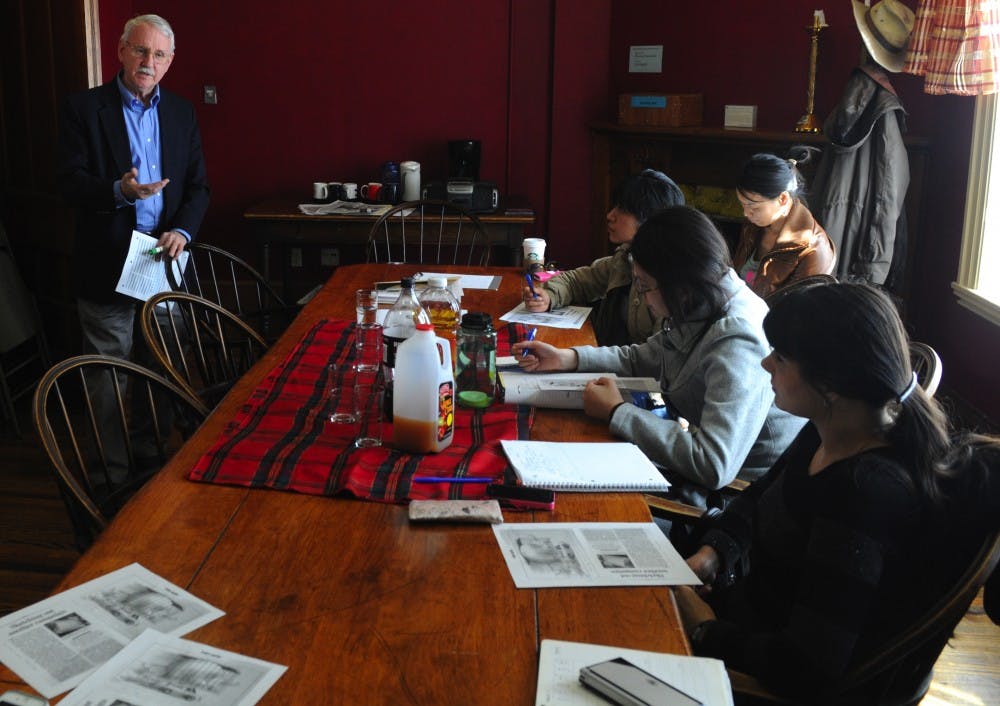While most would easily call the presidential election a ‘big deal,’ foreign students may be stumped by these kinds of idioms.
Thankfully, one English as a Second Language program, that is celebrating its 15th anniversary at Penn, helps internationals cross the language barrier.
‘SLANGuage,’ a free ESL class hosted by The Christian Association at Penn, aims to educate students about idioms and slang language that they might not learn in a more formal English language course.
According to William Kelly, the founder of SLANGuage and the Coordinator of International Programs at the Christian Association, the ESL course is designed to allow foreigners to interact more successfully with Americans.
“We had the idea of having a hospitality ministry, where internationals could come and ask American teachers about cultural issues that confused them,” he said. He added that, “we hope that they will find it easier to make friends with Americans.”
Typical activities include reading articles, listening to American music and speaking in English about current issues. At a meeting yesterday, Kelly discussed topics such as the Trayvon Martin shooting and the presidential election, while attempting to explain phrases like “primary elections” to the five-person class.
Kelly, who holds a degree in Russian and is competent in French, German and Spanish, sympathizes with students who struggle to adopt slang terms.
“The people I get in here all know the basics of English really well, but slang is one of things they have trouble with,” he said, adding that generational and regional variations of English slang also pose a challenge.
SLANGuage classes are mostly attended by post-graduates or the spouses of faculty and teaching fellows at Penn. Although class numbers have varied over the past few years, Kelly said he usually sees an average of about 10 students every class.
According to Kelly, many students come and go, but some stay on months, or even a few years, depending on their length of tenure.
Mina Mizumatsu, a student in the Graduate School of Education from Japan attended her first SLANGuage class last week. She hopes that the course will help her understand some of slang her American friends use.
“We learned English at school from textbooks, but when I get into the classroom here, it’s mixed up with slang, it’s difficult to understand,” she said. “There are so many different types of English, it is hard to adjust coming to Philadelphia.”
Mariska Idema, a native of the Netherlands whose husband works at Penn, feels the methods used at SLANGuage are more instructive than learning idiomatic phrases from a book.
“It’s more useful to speak with people,” she said, adding that, “I think this class is special because you get to learn about politics and American culture.”
Kelly’s idea to start a slang language program came after a 1997 visit to China.
Kelly said currently, more than half of his students are from China, many of whom have questions about Christianity and religion.
Although SLANGuage is hosted by the Christian Association, it is not religiously affiliated. However, the class often includes discussions on peace and justice, such as the Occupy movement.
Kelly, himself a Presbyterian, feels his faith has motivated him to continue with the program.
“I want to help people, and I feel I have a special skill to help people crossing the cultural barrier,” he said.
While SLANGuage has no grading system or tests, Kelly feels he can attest to the program’s success anecdotally.
“There are some students who come back twenty or thirty times,” he said.
College freshman Qingying Xia, who studied English as a foreign language while in school in China, feels that culture programs such as SLANGuage can help international students at Penn.
Though she has never attended a class, she feels it would be worthwhile. “I didn’t know what phrases like ‘trash’ or ‘wasted’ meant when I came here. It’s easier to pick it up when you are around students a lot,” she said.
The photo caption has been revised to reflect that the program was founded in 1998, not 1997.



